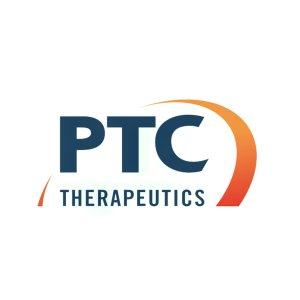PTC Therapeutics Announces Positive Results from Long-Term Treatment Studies and Updates on Regulatory Progress for Vatiquinone Friedreich Ataxia Program
Rhea-AI Summary
PTC Therapeutics (NASDAQ: PTCT) announced positive updates on its vatiquinone Friedreich ataxia (FA) program. Two long-term extension studies met their pre-specified endpoints, showing statistically significant evidence of durable treatment benefit on disease progression. Key findings include:
1. MOVE-FA study: 144 weeks of vatiquinone treatment resulted in a 3.7-point benefit (p<0.0001, N=70) on the modified Friedreich Ataxia Rating Scale (mFARS).
2. Earlier study: 24-months of vatiquinone treatment showed a 4.8-point benefit on mFARS (p<0.0001, N=41).
PTC plans to submit a New Drug Application (NDA) for vatiquinone in December 2024, following alignment with FDA on key aspects. The company aims to provide a potentially meaningful therapy for all FA patients, particularly children and adolescents for whom no approved therapies exist.
Positive
- Vatiquinone showed a 3.7-point benefit on mFARS after 144 weeks of treatment (p<0.0001, N=70)
- 24-month treatment with vatiquinone demonstrated a 4.8-point benefit on mFARS (p<0.0001, N=41)
- Vatiquinone continued to be safe and well-tolerated with no treatment-related serious adverse events reported
- PTC plans to submit a New Drug Application (NDA) for vatiquinone in December 2024
- The treatment difference represents a clinically meaningful 50% slowing in disease progression over 3 years
Negative
- None.
News Market Reaction 1 Alert
On the day this news was published, PTCT gained 16.52%, reflecting a significant positive market reaction.
Data tracked by StockTitan Argus on the day of publication.
- Statistically significant results on primary endpoint of long-term study analyses -
- Following FDA pre-NDA feedback, submission on track for December 2024 -
"The results of the extension studies provide further evidence of the potential benefit of vatiquinone in slowing disease progression," said Matthew B. Klein, M.D., Chief Executive Officer of PTC Therapeutics. "In addition, the strong safety profile of vatiquinone positions it to be a potentially meaningful therapy for all Friedreich ataxia patients, particularly children and adolescents for whom there are no approved therapies. We look forward to submitting the NDA by the end of the year."
Analysis of the MOVE-FA long-term extension study demonstrated that 144 weeks of vatiquinone treatment resulted in a 3.7-point benefit (p<0.0001, N=70) on the modified Friedreich Ataxia Rating Scale (mFARS) relative to a matched natural history cohort from the FACOMS (Friedreich Ataxia Clinical Outcome Measures) disease registry. This treatment difference on the primary endpoint represents a clinically meaningful
In addition, PTC analyzed long-term open-label data from an earlier study of vatiquinone in adults with FA. Following 24-months of treatment with vatiquinone, subjects had a 4.8-point benefit on the mFARS relative to a matched natural history population (p<0.0001, N=41).
"MOVE-FA was a well-conducted international clinical trial in children and adults with Friedreich's ataxia. Both this trial data and the open-label extension data are compelling with positive results in clinical endpoints that are meaningful to the FA community," said Jennifer Farmer, Chief Executive Officer of the Friedreich's Ataxia Research Alliance (FARA). "We are also encouraged that vatiquinone treatment continues to be safe and well-tolerated. Given the high unmet need, especially in the pediatric population, we are excited that PTC Therapeutics is submitting an NDA."
PTC plans to submit the vatiquinone NDA in December 2024. The NDA will include results from the placebo-controlled portion of the MOVE-FA study in which there was significant benefit recorded on the Upright Stability Subscale of the mFARS. This subscale is the most relevant and sensitive mFARS component for pediatric and young adults. The NDA will also include confirmatory evidence from the two long-term treatment analyses discussed above, as well mechanistic data demonstrating treatment effect on biomarkers of disease pathology.
About Vatiquinone
Vatiquinone is a small molecule, first-in-class selective inhibitor of 15-Lipoxygenase (15-LO), an enzyme that is a key regulator of the energetic and oxidative stress pathways that are disrupted in Friedreich ataxia. Inhibition of 15-LO helps to alleviate the consequences of mitochondrial dysfunction and oxidative stress, ultimately preventing ferroptosis and aiding neuronal survival.1,2,3 Vatiquinone has been evaluated in a number of clinical studies, many focused on pediatric patients, and has demonstrated an impact on mortality risk and a number of neurological and neuromuscular disease symptoms.
About MOVE-FA
MOVE-FA was a global registration-directed trial of vatiquinone that enrolled 146 pediatric, adolescent and adult FA patients, the majority of whom were under 18 years of age. The study included a 72-week placebo-controlled phase and a long-term open-label extension. While the primary endpoint of change from baseline in the overall mFARS score did not reach statistical significance (p=0.14), statistically significant effect (p=0.021) was recorded on the mFARS upright stability subscale, which was a pre-specified endpoint. In addition, the effect on upright stability was concordant with favorable treatment effect on the 1-minute walk distance test and the functional component of the Modified Fatigue Rating Scale. Following completion of MOVE-FA, subjects were eligible to enroll in a long-term open-label extension study which is ongoing.
About Friedreich Ataxia
Friedreich ataxia (FA) is a rare, physically debilitating, life-shortening, neuromuscular disorder that mainly affects the central nervous system and the heart.4 It is the most common hereditary ataxia (abnormal, uncoordinated movements) and is usually caused by a single genetic defect in the frataxin (FXN) gene that leads to reduced production of frataxin, a mitochondrial protein that is important for cellular metabolism and energy production.4,5 Decreased frataxin levels are associated with mitochondrial iron accumulation and increased oxidative stress, which can lead to cell death through ferroptosis.6,7,8
Symptoms include progressive loss of coordination and muscle strength leading to poor balance and coordination, difficulty speaking, swallowing, and breathing, curvature of the spine, serious heart conditions, diabetes, and hearing and vision impairment.9,10 The severity of symptoms and speed of progression varies between people and some symptoms may not be evident in all. Friedreich ataxia is usually diagnosed in childhood or adolescence.5,11 Approximately 25,000 people have Friedreich ataxia globally.
About PTC Therapeutics, Inc.
PTC is a global biopharmaceutical company focused on the discovery, development and commercialization of clinically differentiated medicines that provide benefits to children and adults living with rare disorders. PTC's ability to innovate to identify new therapies and to globally commercialize products is the foundation that drives investment in a robust and diversified pipeline of transformative medicines. PTC's mission is to provide access to best-in-class treatments for patients who have little to no treatment options. PTC's strategy is to leverage its strong scientific and clinical expertise and global commercial infrastructure to bring therapies to patients. PTC believes this allows it to maximize value for all its stakeholders. To learn more about PTC, please visit us at www.ptcbio.com and follow us on X, Facebook, Instagram and LinkedIn.
For More Information:
Investors:
Investor Relations
+1 (908) 912-9848
ir@ptcbio.com
Media:
Jeanine Clemente
+1 (908) 912-9406
jclemente@ptcbio.com
Forward-Looking Statement
This press release contains forward-looking statements within the meaning of The Private Securities Litigation Reform Act of 1995. All statements contained in this release, other than statements of historic fact, are forward-looking statements, including statements regarding: the future expectations, plans and prospects for PTC, including with respect to the expected timing of regulatory submissions and responses, commercialization and other matters with respect to its products and product candidates; PTC's strategy, future operations, future financial position, future revenues, projected costs; the extent, timing and financial aspects of our strategic pipeline prioritization and reductions in workforce; and the objectives of management. Other forward-looking statements may be identified by the words, "guidance", "plan," "anticipate," "believe," "estimate," "expect," "intend," "may," "target," "potential," "will," "would," "could," "should," "continue," and similar expressions.
PTC's actual results, performance or achievements could differ materially from those expressed or implied by forward-looking statements it makes as a result of a variety of risks and uncertainties, including those related to: the outcome of pricing, coverage and reimbursement negotiations with third party payors for PTC's products or product candidates that PTC commercializes or may commercialize in the future; expectations with respect to vatiquinone, including any regulatory submissions and potential approvals, commercialization, the potential achievement of development, regulatory and sales milestones and contingent payments that PTC may be obligated to make; significant business effects, including the effects of industry, market, economic, political or regulatory conditions; changes in tax and other laws, regulations, rates and policies; the eligible patient base and commercial potential of PTC's products and product candidates; PTC's scientific approach and general development progress; and the factors discussed in the "Risk Factors" section of PTC's most recent Annual Report on Form 10-K, as well as any updates to these risk factors filed from time to time in PTC's other filings with the SEC. You are urged to carefully consider all such factors.
As with any pharmaceutical under development, there are significant risks in the development, regulatory approval and commercialization of new products. There are no guarantees that any product will receive or maintain regulatory approval in any territory, or prove to be commercially successful, including vatiquinone.
The forward-looking statements contained herein represent PTC's views only as of the date of this press release and PTC does not undertake or plan to update or revise any such forward-looking statements to reflect actual results or changes in plans, prospects, assumptions, estimates or projections, or other circumstances occurring after the date of this press release except as required by law.
References:
- Hinman A, et al. PLoS one. 2018;13:e0201369.
- PTC Therapeutics. EPI-743 Pre-Clinical Data Deck.
- Shrader WD, et al. Bioorg Med Chem Lett. 2011;21:3693–3698.
- Lynch DR, Farmer JM, Balcer LJ, et al. Arch Neurol 2002;59(5):743–747.
- Campuzano V, Montermini L, Lutz Y, et al. Hum Mol Genet 1997;11(6):1771–1780.
- Campuzano V, et al. Hum Mol Genet. 1997;6:1771–1780.
- Cook A, Giunti P. Br Med Bull. 2017;124:19–30.
- Pandolfo M, Hausmann L. J Neurochem. 2013;126:142–146.
- Bürk K. Cerebellum Ataxias 2017;4:4.
- Cook A, Giunti P. Br Med Bull 2017;124(1):19–30.
- Delatycki MB, Williamson R, Forrest SM. J Med Genet 2000;37(1):1–8.
SOURCE PTC Therapeutics, Inc.









